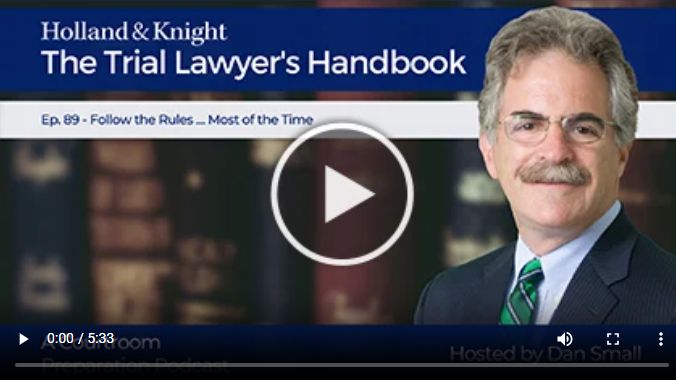Sometimes, it can pay off to bend the rules. In this episode of his "Trial Lawyer's Handbook" podcast series, litigation attorney Dan Small reflects on his experience prosecuting the Farmer's Export grain elevator explosion case. He recalls how the defense's grain dust expert struck him as "too brief" and "too smooth." Trusting his instincts rather than simply following standard procedure, he began to rigorously question the witness during cross-examination, asking both open-ended and leading questions to test his expertise. After more than an hour of persistent inquiry, Mr. Small was able to reveal that the expert was not as knowledgeable as he initially seemed, resulting in the breakdown of a key part of the opposing side's case.
Listen to more episodes of The Trial Lawyer's Handbook here.
This podcast episode was adapted from Mr. Small's book Lessons Learned from a Life on Trial: Landmark Cases from a Veteran Litigator and What They Can Teach Trial Lawyers.
Podcast Transcript
Dan Small: The lawyer is the captain of the ship at trial, and the captain has to be prepared for stormy weather. But if you haven't become as expert as your expert witness, how can you understand what's coming, or prepare for it? The defense in the Farmer's Export grain elevator explosion case that we've been talking about for the past several episodes had found its own grain dust expert to counter our expert. He was not as qualified as my expert, but he was very smooth.
On direct examination, their expert gave defense counsel a surprisingly brief but very neatly packaged presentation. It was well done. I probably should have left it alone and let my expert counter it, but a little voice in the back of my head kept saying, "Too brief and too smooth." What to do?
The late, great Irving Younger's "Ten Commandments of Cross-Examination" lecture is filled with warnings against winging it on cross-examination. Don't ask a question you don't know the answer to. Don't ask open questions. Don't let the witness explain. And don't ask the one question too many. I had heard his wonderful lecture. You should go find it and listen to it. It's marvelous, it's entertaining and enlightening. And I knew the horror stories that he tells and that you hear elsewhere of lawyers far more experienced than me who had violated those commandments. But there was that insistent voice in my head: "Too brief, too smooth."
Trials often come down to a tough call between following the rules and following your instincts. Most of the time, following the rules is a safer course. Maybe I was just too young and too stupid. Maybe I just was lucky. Whatever the reason, I started lobbing questions at their expert on cross-examination. Open questions, leading questions, all kinds of questions, testing his knowledge. Irving Younger would have come after me with a baseball bat.
The first couple of questions were disastrous, and a wiser man would have stopped then. They just gave him the opportunity to repeat parts of his nice little presentation, which he did, almost word for word. Surprisingly, the little voice in my head didn't say, "Sorry, I blew it, sit down before this gets worse." Instead, it said, "Listen, use your ears, just like I told you. Too smooth, too brief, too smooth." So I threw out another question and got another rewind of his direct examination, and then it hit me. That's all there was. This witness' expertise was only an inch deep, and he had given it all on direct examination. There was nothing behind it. No one who knew the subject matter on the other side had questioned him to see how he would do on cross-examination. I think they were as surprised as I was.
I went on for another hour or more peppering him with questions, demanding details, support, explanations, backup, you name it — things a good expert would have killed me on. I'd never cross-examined an expert witness before. What the heck did I know? But it seemed to be the right thing to do. And with this witness, it worked. Slowly but surely, everyone in the courtroom realized that they'd been conned. The smooth presentation was just the front. There was nothing behind the curtain. Through no particular skill of mine, the witness was pretty much destroyed. He left the stand and his name was never spoken again, even in the defense closing, all because of that little voice: "Too smooth, too brief."
So listen, listen, listen, listen to your instincts. Listen to the testimony, to what the jury is really hearing. And then follow the rules, well, most of the time. You're a trial lawyer. Know your case. And if you know your case, believe in yourself and act accordingly.
The content of this article is intended to provide a general guide to the subject matter. Specialist advice should be sought about your specific circumstances.


